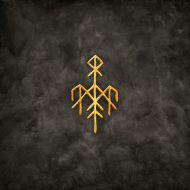 What better way to introduce Ragnarok, the third and final part of Wardruna’s 8-year trilogy, with a towering battle hymn to Tyr. One of the less readily recognised Norse gods these days (at least for non-metal fans I should perhaps add), but he was undoubtedly an important figure in the dark ages and beyond: Tyr, Tiw, Tiwas. Wardruna provides a chilling take on the power of a god that must have rivalled Odin and Thor in his day in the hearts of the populations of Northern Europe and was worshipped across the continent. Pulsing with Einar Selvik’s multi-layered percussion and reverberating with the sounds of Nordic instruments, Tyr is a reminder of the sheer power these names must have invoked. If any evidence is needed that Wardruna are channelling something special look no further.
What better way to introduce Ragnarok, the third and final part of Wardruna’s 8-year trilogy, with a towering battle hymn to Tyr. One of the less readily recognised Norse gods these days (at least for non-metal fans I should perhaps add), but he was undoubtedly an important figure in the dark ages and beyond: Tyr, Tiw, Tiwas. Wardruna provides a chilling take on the power of a god that must have rivalled Odin and Thor in his day in the hearts of the populations of Northern Europe and was worshipped across the continent. Pulsing with Einar Selvik’s multi-layered percussion and reverberating with the sounds of Nordic instruments, Tyr is a reminder of the sheer power these names must have invoked. If any evidence is needed that Wardruna are channelling something special look no further.
So what else has it got? Is this a worthy successor to the first two parts of this ambitious project? Wardruna set out all those years ago, back in 2003, to create powerful traditional Nordic sounds while also defining musical interpretations of each of the twenty-four old Germanic runes along the way. The first album in January 2009 (is it really that long ago?) was the first most of us had heard about Wardruna’s darkened folk perspective (although the involvement of former Gorgoroth front man Gaahl undoubtedly helped raise the band’s profile a little). If you’ve not heard Wardruna by now you’ve obviously not been sucked into the whole ‘Vikings’ television show thing (they helped with the soundtrack for the second series), the background music to Gaahl’s appearance in True Norwegian Black Metal as well as touring pretty heavily – which is a feat in itself given the wide ranging nature and depth of the band’s sound (using trees for percussion?).
There’s definitely a cinematic appeal to Wardruna but it ain’t sugary – far from it. Norwegian jazz saxophonist Jan Garbarek always springs to mind, mingling in to the heavy Norse paganisms as well as, perhaps (and I’m looking for the widest possible reference point here), a bit of Enya and Falkenbach unplugged. But Wardruna is far more elemental than all those things combined and so drafts in the wilds for help in his bid to provide a voice that travels through the ages but is inescapably rooted in the present.
The result for someone, like me, who has been obsessed with Viking sagas since he was a kid is a mouth-watering prospect. This is also one of my favourites of the trilogy. It invokes the best possible echoes of the tribal sounds and images of the Viking age, from the pastoral life, awe inspiring rituals and celebrations, the beating of the oars on the oceans as well as the inevitable rumblings from the dawn of battles. Ragnarok is the sound of bonfires scraping the night sky on tracks like UruR and Lindy Fay Hella’s voice bouncing off the fjords and weaving through the pine forests on Isa and Raido (Enslaved fans will no doubt recognise the names of some of the runes – this one meaning ‘ride’ or ‘journey’).
If you’re not lost in thought or images of the past by the end of the seventh track, this is where Wardruna begin to let off a few of the fireworks in their arsenal – children’s chants and choirs on Odal and Wunjo and the final pounding seven minute Runaljod which serves to book-end the album and challenge even the mighty opener Tyr. It’s easy to see why this appeals to metal fans even though record stores must struggle whether to place this in the ‘metal’ or ‘world music’ department. It’s not metal really but it appeals to the rising recognition of pre-Christian culture in Europe which was washed away at the end of the dark ages ([insert lengthy debate here] and rejection of mainstream religions – and the need for something more personal. If you don’t find the answer to all of that within Wardruna then maybe you’ll find something else under the branches of this towering and organic sound.
(8.5/10 Reverend Darkstanley)

02/04/2017 at 3:27 am
Know of any bands similar to Wardruna? Something atmospheric and tribal at the same time. Not looking for guitars.